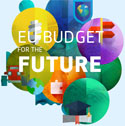EU Budget: the Commission presents proposals to deepen the Economic and Monetary Union and to boost investments, jobs and innovation across Europe

date: 11/06/2018
See also: Press release
For the next long-term EU budget 2021-2027, the Commission has unveiled several programmes that will further strengthen Europe's Economic and Monetary Union (EMU) and boost job creation, investment and innovation. To deepen EMU, on 31 May the Commission proposed to create a Reform Support Programme, with an overall budget of EUR 25 billion which will support priority reforms in all EU Member States, and a European Investment Stabilisation Function, which through loans of up to EUR 30 billion will help stabilise public investment levels and facilitate rapid economic recovery in cases of significant economic shocks in Member States of the euro area and those participating in the European Exchange Rate Mechanism (ERM II). The proposals combine the key principles of solidarity and responsibility at all levels and deliver on the commitments made by President Juncker in his 2017 State of the Union Address. In order to boost investments, on 6 June the Commission proposed the InvestEU Programme, which will bring together the multitude of EU financial programmes currently available while expanding the successful model of the Investment Plan for Europe, the Juncker Plan. The Commission is proposing that EUR 15.2 billion be earmarked for the Fund so that the EU budget can provide a EUR 38 billion guarantee, and thereby trigger more than EUR 650 billion in additional investment across the EU over the 7-year period. The InvestEU Fund supports four policy areas – sustainable infrastructure; research, innovation and digitisation; small and medium-sized businesses; and social investment and skills – and will have a single, coherent governance structure and reporting requirements, avoiding overlaps.
